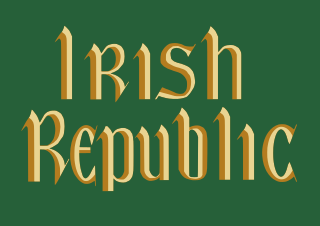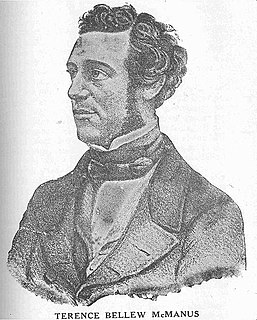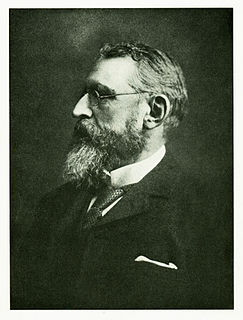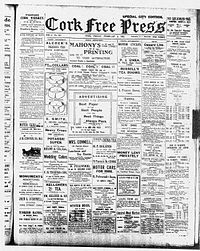A United Ireland is a hypothetical sovereign state comprising the island of Ireland, currently divided between the Republic of Ireland and Northern Ireland.
United Ireland or United Irelander may also refer to

The Nation was an Irish nationalist weekly newspaper, published in the 19th century. The Nation was printed first at 12 Trinity Street, Dublin from 15 October 1842 until 6 January 1844. The paper was afterwards published at 4 D'Olier Street from 13 July 1844, to 28 July 1848, when the issue for the following day was seized and the paper suppressed. It was published again in Middle Abbey Street on its revival in September 1849.

Irish nationalism is a nationalist political movement which, in its broadest sense, asserts that the people of Ireland should govern Ireland as a sovereign state. Since the mid-19th century, Irish nationalism has largely taken the form of cultural nationalism based on the principles of national self-determination and popular sovereignty. Irish nationalists during the 18th, 19th, and 20th centuries such as the United Irishmen in the 1790s, Young Irelanders in the 1840s, the Fenian Brotherhood during the 1880s, Fianna Fáil in the 1920s, and Sinn Féin styled themselves in various ways after French left-wing radicalism and republicanism. Irish nationalism celebrates the culture of Ireland, especially the Irish language, literature, music, and sports. It grew more potent during the period in which all of Ireland was part of the United Kingdom, which led to most of the island gaining independence from the UK in 1922.

William O'Brien was an Irish nationalist, journalist, agrarian agitator, social revolutionary, politician, party leader, newspaper publisher, author and Member of Parliament (MP) in the House of Commons of the United Kingdom of Great Britain and Ireland. He was particularly associated with the campaigns for land reform in Ireland during the late 19th and early 20th centuries as well as his conciliatory approach to attaining Irish Home Rule.

Irish republicanism is the political movement for the unity and independence of Ireland under a republic. Irish republicans view British rule in any part of Ireland as inherently illegitimate.

William Smith O'Brien was an Irish nationalist Member of Parliament (MP) and a leader of the Young Ireland movement. He also encouraged the use of the Irish language. He was convicted of sedition for his part in the Young Irelander "Famine Rebellion" of 1848 but his sentence of death was commuted to deportation to Van Diemen's Land. In 1854, he was released on the condition of exile from Ireland, and he lived in Brussels for two years. In 1856 Smith O'Brien was pardoned and returned to Ireland, but he was never active again in politics.

John Blake Dillon was an Irish writer and politician who was one of the founding members of the Young Ireland movement.

Terence Bellew MacManus was an Irish rebel who participated in the Young Irelander Rebellion of 1848. Sentenced to death for treason, he and several other participants were given commuted sentences in 1849 and transported for life to Van Diemen's Land in Australia. Three years later in 1852, MacManus escaped and emigrated to the United States.

Young Ireland was a political and cultural movement in the 1840s committed to an all-Ireland struggle for independence and democratic reform. Grouped around the Dublin weekly The Nation, it took issue with the compromises and clericalism of the larger national movement, Daniel O'Connell's Repeal Association, from which it seceded in 1847. Despairing, in the face of the Great Famine, of any other course, in 1848 Young Irelanders attempted an insurrection. Following the arrest and the exile of most of their leading figures, the movement split between those who carried the commitment to "physical force" forward into the Irish Republican Brotherhood, and those who sought to build a "League of North and South" linking an independent Irish parliamentary party to tenant agitation for land reform.

The All-for-Ireland League (AFIL) was an Irish, Munster-based political party (1909–1918). Founded by William O'Brien MP, it generated a new national movement to achieve agreement between the different parties concerned on the historically difficult aim of Home Rule for the whole of Ireland. The AFIL established itself as a separate non-sectarian party in the House of Commons of the United Kingdom of Great Britain and Ireland, binding a group of independent nationalists MPs to pursue a broader concept of Irish nationalism, a consensus of political brotherhood and reconciliation among all Irishmen, primarily to win Unionist consent to an All-Ireland parliamentary settlement.
The Young Irelander Rebellion was a failed Irish nationalist uprising led by the Young Ireland movement, part of the wider Revolutions of 1848 that affected most of Europe. It took place on 29 July 1848 at Farranrory, a small settlement about 4.3 km north-northeast of the village of Ballingarry, South Tipperary. After being chased by a force of Young Irelanders and their supporters, an Irish Constabulary unit took refuge in a house and held those inside as hostages. A several-hour gunfight followed, but the rebels fled after a large group of police reinforcements arrived.

The United Irish League (UIL) was a nationalist political party in Ireland, launched 23 January 1898 with the motto "The Land for the People". Its objective to be achieved through agrarian agitation and land reform, compelling larger grazier farmers to surrender their lands for redistribution among the small tenant farmers. Founded and initiated at Westport, County Mayo by William O'Brien, it was supported by Michael Davitt MP, John Dillon MP, who worded its constitution, Timothy Harrington MP, John O'Connor Power MP and the Catholic clergy of the district. By 1900 it had expanded to be represented by 462 branches in twenty-five counties.

Patrick O'Donoghue (1810–1854), also known as Patrick O'Donohoe or O'Donoghoe, from Clonegal, County Carlow, was an Irish Nationalist revolutionary and journalist, a member of the Young Ireland movement.
The Irish Confederation was an Irish nationalist independence movement, established on 13 January 1847 by members of the Young Ireland movement who had seceded from Daniel O'Connell's Repeal Association. Historian T. W. Moody described it as "the official organisation of Young Ireland".
United Irelander is the name of both an Irish political blog as well as the blog's author, who goes by the same name. The site originated in December 2004 and as the name suggests, deals primarily with Irish nationalism and advocating a united Ireland. As a result, it attracts comment from people across various backgrounds in Ireland as well as overseas. The author resides in Dublin, Ireland and argues for a united Ireland based on consent.
John O’Donnell (1866–1920) was an Irish journalist, Nationalist politician and Member of Parliament (MP) in the United Kingdom House of Commons from 1900 to 1910.

Patrick James Smyth, also known as Nicaragua Smyth, was an Irish politician and journalist. A Young Irelander in 1848, and subsequently a journalist in American exile, from 1871 he was an Irish Home Rule Member of the United Kingdom Parliament for Westmeath and from 1880 for Tipperary.

The Cork Free Press was a nationalist newspaper in Ireland, which circulated primarily in the Munster region surrounding its base in Cork, and was the newspaper of the dissident All-for-Ireland League party (1909–1918). Published daily from June 1910 until 1915, and weekly in 1915–16, it was the third of three newspapers founded and published within a decade by William O'Brien MP. It developed a unique approach to the national question and to the social issues of the day, with a pronounced conciliatory view to achieving Home Rule for the whole of Ireland. It displayed a favourable attitude towards the Sinn Féin movement. Its main rival newspapers were the Cork Examiner and the Freeman's Journal.

William Doris was an Irish politician, Member of Parliament, and co-founder of The Mayo News.
The Irish Reform Association (1904–1905) was an attempt to introduce limited devolved self-government to Ireland by a group of reform oriented Irish unionist land owners who proposed to initially adopt something less than full Home Rule. It failed to gain acceptance due to fierce opposition from Ulster Unionists who on the one hand claimed it went too far, and on the other hand denounced by Irish Nationalists who claimed it did not go far enough. Also known as the Irish Reform Movement, it ended in calamity for most of those concerned.
The Irish People was the title of a number of mostly political newspapers in Ireland and America.